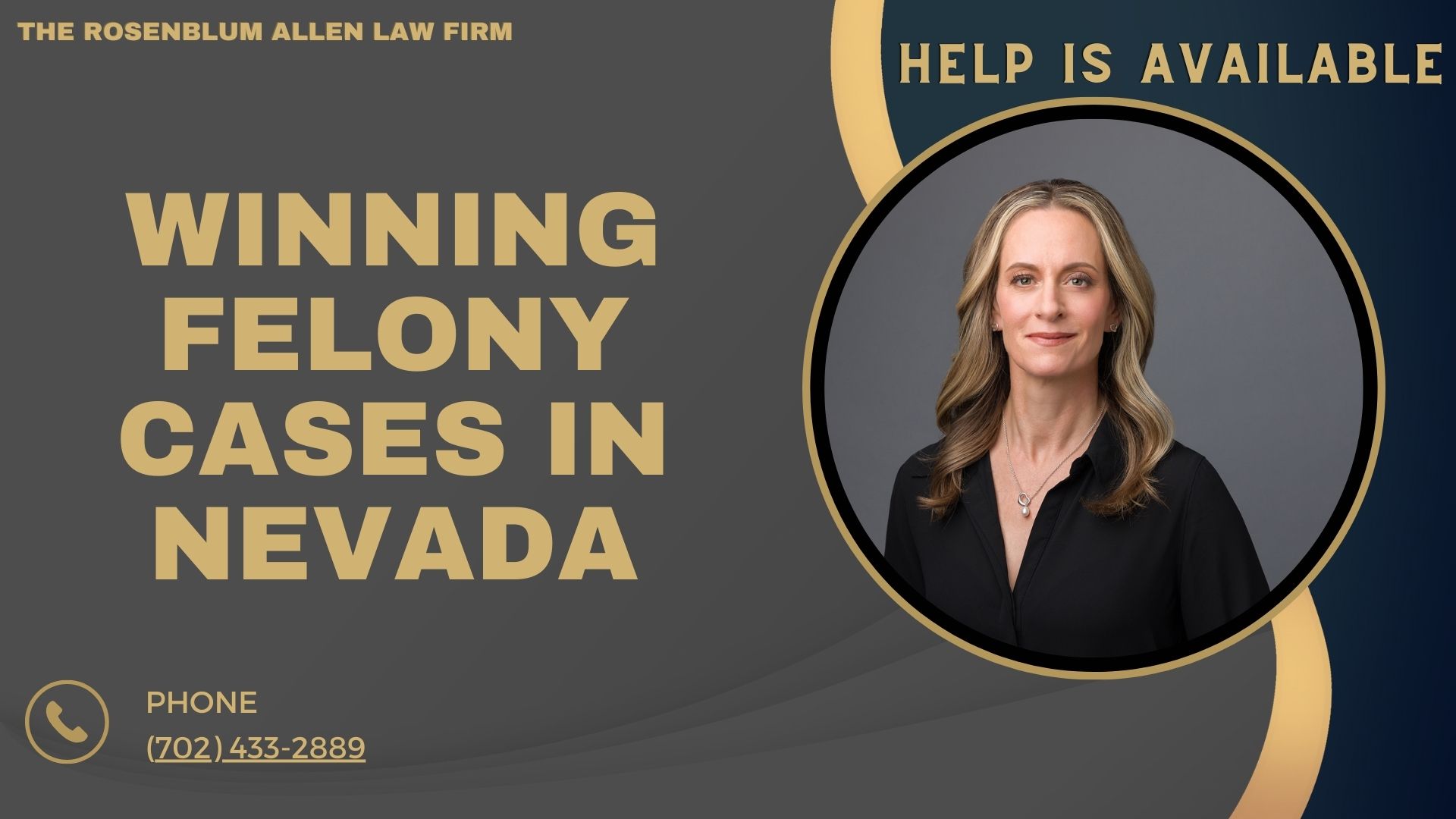Are you facing a felony charge in Nevada? Don’t panic. You can navigate this challenging situation with the right approach and a skilled attorney. Let’s dive into the world of felony cases in the Silver State and explore how to build a winning defense.
 Understanding Felony Cases in Nevada
Understanding Felony Cases in Nevada
Felony charges are serious business. They can turn your life upside down in an instant. But knowledge is power, and understanding what you’re up against is the first step to mounting a successful defense.
Definition of Felony Crimes
In Nevada, a felony is any crime with a potential punishment of at least one year in state prison. These are the big leagues of criminal offenses, folks. We’re not talking about a simple traffic ticket here.
Felonies are more severe than misdemeanors and can have life-altering consequences. A conviction could mean years behind bars, hefty fines, and a permanent stain on your record.
Common Felony Charges
You might wonder what crimes typically lead to felony charges in Nevada. Here are some of the usual suspects:
- Murder or attempted murder
- Sexual assault
- Robbery
- Burglary
- Drug trafficking
- Aggravated assault
- Grand larceny
- Kidnapping
This list isn’t exhaustive, but it gives you an idea of the offenses that fall into the felony category.
Building a Strong Defense
Now that we’ve covered the basics, let’s talk strategy. Winning a felony case isn’t easy, but it’s not impossible. The key is building a rock-solid defense.
Importance of Legal Representation
First things first: if you’re facing a felony charge, you need a lawyer. Not just any lawyer, but one specializing in Nevada criminal defense. This isn’t the time to cut corners or try to go it alone.
A reasonable attorney can:
- Analyze the evidence against you
- Identify weaknesses in the prosecution’s case
- Negotiate with prosecutors for reduced charges or sentences
- Protect your rights throughout the legal process
- Represent you effectively in court
Remember, the prosecution has a team of lawyers working against you. You need someone in your corner who knows the ins and outs of Nevada’s legal system.
Key Defense Strategies
Every case is different, but some common defense strategies can be effective in felony cases. Let’s break them down:

Mistaken Identity
Sometimes, it’s a case of being in the wrong place at the wrong time. If you’ve been misidentified as the perpetrator, your attorney can work to prove that you weren’t the one who committed the crime.
This might involve:
- Challenging eyewitness testimony
- Providing an alibi
- Analyzing surveillance footage
Lack of Intent
Many felony charges require proof that you intend to commit the crime. This could be a viable defense if your actions were accidental or you didn’t understand what you were doing.
Self-Defense
If you protected yourself or others from harm, your actions might be justified under Nevada law. This defense can be particularly relevant in cases involving assault or homicide charges.
Legal Insanity
While rarely used, the insanity defense can be appropriate in some cases. It involves proving that you didn’t understand the nature of your actions or couldn’t distinguish right from wrong due to a mental condition.
Remember, these are just a few potential strategies. Your attorney will help determine the best approach based on the specifics of your case.
Gathering Evidence
Evidence can make or break your case. It’s like assembling a puzzle – every piece matters. Let’s explore the types of evidence that could help you win your felony case in Nevada.
Witness Testimony
Witnesses can be game-changers. They might provide alibis, contradict the prosecution’s story, or offer crucial context. But remember, not all witnesses are created equal. Here’s what to consider:
- Credibility: Is the witness reliable? Do they have a good reputation?
- Consistency: Does their story stay the same over time?
- Corroboration: Can other evidence back up their testimony?
Your attorney will work to find and prepare witnesses who can strengthen your defense. They’ll also cross-examine prosecution witnesses to expose any weaknesses in their testimony.
Physical Evidence
Physical evidence speaks volumes. It’s tangible proof that can support your side of the story. This might include:
- DNA samples
- Fingerprints
- Surveillance footage
- Weapons or tools
- Documents or records
Sometimes, the absence of physical evidence can be just as important as its presence. The prosecution’s lack of concrete proof could weaken their case against you.

Navigating the Legal Process
The legal system can feel like a maze. But don’t worry, we’ll walk you through it step by step. Understanding what to expect can help ease your anxiety and prepare you for what’s ahead.
Arrest and Booking
It all starts here. The arrest can be a scary experience but try to stay calm. Here’s what typically happens:
- You’re taken into custody
- Your personal information is recorded
- Fingerprints and photographs are taken
- You’re placed in a holding cell
Remember, you have rights during this process. The most important is your right to remain silent. Use it. Wait for your attorney before answering any questions.
Bail and Pre-Trial Release
After booking, you might have the opportunity to get bail. This allows you to be released while awaiting trial. The amount depends on factors like:
- The severity of the charge
- Your criminal history
- Your ties to the community
If you can’t afford bail, don’t lose hope. Your attorney can request a bail reduction or argue for your release on your recognizance.
Plea Bargaining
Many cases never make it to trial. Instead, they’re resolved through plea bargaining. This is a negotiation between your attorney and the prosecutor. It might result in:
- Reduced charges
- A lighter sentence
- Dropped charges in exchange for information
Plea bargains can be beneficial but are not always the right choice. Your attorney will help you weigh the pros and cons based on your situation.
Trial Proceedings
If your case goes to trial, here’s a simplified version of what to expect:
- Jury selection
- Opening statements
- The prosecution presents its case
- The defense presents its case
- Closing arguments
- Jury deliberation
- Verdict
Trials can be intense and unpredictable. But with a strong defense strategy and a skilled attorney, you’ve got a fighting chance.
Remember, every step of this process is an opportunity to build your defense. Stay engaged, follow your attorney’s advice, and keep your chin up. The road might be challenging, but with the right approach, winning your felony case in Nevada is possible.
Potential Outcomes
Let’s face it – the suspense of not knowing what will happen can be nerve-wracking. While we can’t predict the future, we can prepare you for the possible outcomes of your felony case. Knowledge is power, so let’s dive in.
Acquittal
Ah, the sweet sound of “not guilty.” An acquittal means you’ve been found innocent of the charges. It’s like a weight lifting off your shoulders. Here’s what happens:
- You’re free to go
- The case is over
- You can’t be tried for the same crime again (thanks, double jeopardy!)
But remember, an acquittal doesn’t erase the fact that you were charged. You might still need to deal with the social and professional fallout. Don’t worry; we’ll discuss cleaning up your record later.
Conviction and Sentencing
Nobody wants to think about this outcome, but being prepared is essential. If you’re found guilty, the judge will determine your sentence. This could include:
- Prison time
- Fines
- Probation
- Community service
- Restitution to victims
Appeals Process
If you’re convicted, it’s not necessarily the end of the road. You have the right to appeal. Think of it as a legal do-over. Here’s how it works:
- Your attorney files a notice of appeal
- They submit a brief outlining why the conviction should be overturned
- The prosecution responds with its brief
- The appeals court reviews the case
- A decision is made to uphold, modify, or overturn the conviction
Appeals can be based on various grounds, such as:
- Legal errors during the trial
- Ineffective assistance of counsel
- Newly discovered evidence
Remember, an appeal isn’t a new trial. It’s a review of the original trial to ensure it was conducted fairly and correctly.

Post-Conviction Options
Even after a conviction, there are still ways to improve your situation. Let’s explore some options that might help you move forward.
Record Sealing
Having a felony on your record can make life challenging. It can affect your job prospects, housing options, and more. But in Nevada, you might be able to seal your record. This means your conviction is hidden from public view.
Here’s what you need to know:
- Not all felonies are eligible for sealing
- There’s usually a waiting period (often 7-15 years)
- You must have completed your sentence and stayed out of trouble
Sealing your record can give you a fresh start if you’re eligible. It’s like hitting the reset button on your life.
Pardons and Clemency
A pardon is like the ultimate get-out-of-jail-free card. It’s an official forgiveness of a crime granted by the governor. Clemency is similar but might reduce your sentence rather than completely forgiving the crime.
Getting a pardon or clemency isn’t easy. It typically requires:
- A significant amount of time since the conviction
- Evidence of rehabilitation
- Support from the community
While these options are rare, they’re not impossible. It might be worth exploring if you’ve indeed turned your life around.
Remember, the journey doesn’t end with a conviction. There are always options to improve your situation and work towards a better future. Stay positive, stay proactive, and don’t be afraid to seek help when needed.
Choosing the Right Attorney
When facing a felony charge in Nevada, your choice of attorney can make or break your case. It’s like picking a dance partner for the most critical performance of your life. You need someone who knows all the right moves and won’t step on your toes. Let’s talk about how to find that perfect legal partner.
Qualities to Look For
Not all attorneys are created equal. Here are some essential qualities to keep an eye out for:
- Experience: Look for someone who’s been around the block a few times with Nevada felony cases.
- Specialization: A jack-of-all-trades might be great for home repairs, but for your freedom, you want a specialist in criminal defense.
- Local knowledge: Nevada laws have their quirks. You need someone who knows them inside and out.
- Communication skills: Your attorney should be able to explain complex legal concepts in a way that doesn’t make your head spin.
- Dedication: You want someone who’ll fight for you like a mama bear protecting her cubs.
- Track record: Past performance doesn’t guarantee future results but is a good indicator.
- Availability: Your attorney should be there when you need them, not playing phone tag while sweating bullets.
Questions to Ask
When you’re interviewing potential attorneys, don’t be shy. This is your life on the line. Here are some questions to help you separate the wheat from the chaff:
- How many felony cases have you handled in Nevada?
- What’s your success rate with cases similar to mine?
- How do you plan to approach my case?
- Will you handle my case personally, or will it be passed to an associate?
- How often will we communicate about my case?
- What are the potential outcomes you foresee?
- How do you bill for your services?
Remember, a reasonable attorney won’t guarantee a specific outcome. If they do, that’s a red flag. They should be honest about the challenges and realistic about the possibilities.
Protecting Your Rights
Knowledge is power, especially when it comes to your rights. Let’s arm you with the information you need to protect yourself during this challenging time.
Miranda Rights
You’ve heard them on TV a million times, but do you know what they mean? Here’s a breakdown:
“You have the right to remain silent.”
- Translation: You don’t have to say anything to the police. And in most cases, you shouldn’t.
“Anything you say can and will be used against you in court.”
- Translation: If you talk, assume it’ll end up as evidence. Choose your words carefully.
“You have the right to an attorney.”
- Translation: You can have a lawyer present during questioning. Use this right!
“If you cannot afford an attorney, one will be appointed for you.”
- Translation: Don’t let finances stop you from getting legal help. The court will provide a public defender if needed.

Search and Seizure Laws
The Fourth Amendment is your friend here. It protects you from unreasonable searches and seizures. Here’s what you need to know:
- Police generally need a warrant to search your property.
- There are exceptions, such as if they see evidence of a crime in plain view.
- You can refuse a search request, but if they have a warrant, don’t resist.
- If you’re arrested, police can search you and your immediate surroundings without a warrant.
Remember, even if you think a search is illegal, don’t physically resist. Let your attorney fight it out in court later.
Right to Remain Silent
This might be the most important right you have. Here’s why:
- Anything you say can be used as evidence against you.
- You can’t talk your way out of an arrest.
- Even innocent statements can be misinterpreted or taken out of context.
If you’re arrested or questioned, politely say something like, “I’m exercising my right to remain silent. I want to speak to an attorney.” Then zip it—no ifs, ands, or buts.
Protecting your rights isn’t about being difficult or uncooperative. It’s about ensuring you get a fair shake in the legal system. Don’t be afraid to assert your rights – that’s what they’re there for.
Navigating a felony case in Nevada is no walk in the park. But you’ve got a fighting chance with the right attorney, a solid understanding of the process, and a firm grasp of your rights. Stay strong, stay informed, and don’t lose hope. You’ve got this!

Conclusion
Remember, winning a felony case isn’t just about avoiding a guilty verdict. It’s about ensuring that your rights are protected, that you’re treated fairly by the system, and that you have the best possible outcome given your circumstances.
This journey won’t be easy. There will be moments of fear, frustration, and uncertainty. But with perseverance, a solid legal strategy, and unwavering advocacy from your chosen attorney, you can navigate this challenging terrain.
Don’t let a felony charge define your future. Take control of your situation. Stay informed, stay proactive, and don’t lose hope. The road ahead may be challenging, but with the right approach, you can overcome this obstacle and move forward with your life.
You’re not alone in this fight. With the proper support and resources, you can face this challenge head-on. Remember, every legal battle is a chance to stand up for yourself and your rights. So stand tall, stay strong, and keep fighting. Your future self will thank you for it.

Frequently Asked Questions
How long does a felony trial typically last in Nevada?
The duration of a felony trial can vary widely depending on the case’s complexity. Some trials may be completed in a few days, while others can last several weeks or months. Factors influencing the length include the number of witnesses, the amount of evidence to be presented, and any legal challenges during the proceedings.
Can I choose my attorney if I can’t afford one?
The court will appoint a public defender if you can’t afford an attorney. While you can’t choose a specific public defender, you can request a different one if you have valid concerns about your representation. Remember, public defenders are experienced attorneys who specialize in criminal defense.
What’s the difference between a felony and a misdemeanor in Nevada?
The main difference lies in the severity of the punishment. Felonies are more severe crimes that typically carry a minimum sentence of one year in state prison. Conversely, misdemeanors are less serious offenses that are punishable by up to one year in county jail, fines, or both.
Can a felony charge be reduced to a misdemeanor?
In some cases, yes. This is often part of plea bargaining. Your attorney may negotiate with the prosecutor to reduce the charges, especially if it’s your first offense or mitigating circumstances exist. However, this isn’t possible for all felony charges, particularly for more severe crimes.
How will a felony conviction affect my right to own firearms?
A felony conviction in Nevada typically results in the loss of your right to own or possess firearms. This is a federal law that applies in all states. Restoring this right can be challenging and often requires a pardon or expungement of your record.
Can I vote if I’m convicted of a felony in Nevada?
As of 2019, Nevada law automatically restores voting rights to individuals upon release from prison. This means you can register to vote immediately after serving your sentence, even on parole or probation.
Will I lose my professional license if convicted of a felony?
Many professional licensing boards in Nevada have the authority to suspend or revoke licenses for felony convictions. However, this isn’t automatic and often depends on the nature of the crime and its relevance to your profession. It’s crucial to inform your attorney if you hold a professional license so they can help mitigate potential consequences.
Can I travel internationally with a felony conviction?
International travel can be challenging for individuals with felony records. Many countries have restrictions on admitting individuals with criminal records. While it’s not impossible, you may need to obtain special permissions or visas. Always check the entry requirements of your destination country well in advance.
How long will a felony stay on my record in Nevada?
A felony conviction typically remains on your record indefinitely unless you’re eligible for and complete the record-sealing process. The waiting period for record sealing varies depending on the offense, ranging from 2 to 10 years after completing your sentence.
Can I serve my sentence under house arrest instead of in prison?
House arrest, or residential confinement, is sometimes available as an alternative to prison in Nevada, particularly for less severe felonies or for offenders with particular circumstances. However, this is at the judge’s discretion and isn’t available for all felonies.

Glossary
Acquittal: A verdict pronouncing a criminal defendant not guilty of the charged offense.
Aggravating Factors: Circumstances that increase the severity or culpability of a criminal act, potentially leading to a harsher sentence.
Alibi: Evidence that a defendant was elsewhere when the crime was committed.
Appeal: A request to a higher court to review and change a lower court’s decision.
Bail: Money or property given to the court to secure a defendant’s release from custody and ensure their appearance at future court proceedings.
Clemency: Mercy or leniency shown by the state to a convicted individual, often in the form of a reduced sentence.
Corroboration: Evidence that confirms or supports a witness’s testimony or other evidence in a case.
Cross-examination: The questioning of a witness by the opposing party’s attorney.
Defendant: The person accused of committing a crime in a criminal proceeding.
Double Jeopardy: A constitutional protection that prevents an individual from being tried twice for the same crime.
Exculpatory Evidence: Evidence that tends to show a defendant’s innocence.
Felony: A severe crime typically punishable by imprisonment for more than one year or death.
Grand Jury: A group of citizens who decide whether there is enough evidence to bring criminal charges against a suspect.
Indictment: A formal accusation of a crime, typically issued by a grand jury.
Mitigating Circumstances: Factors that may lessen the severity of a criminal act.
Miranda Rights: Law enforcement must communicate constitutional rights to a suspect before custodial interrogation.
Misdemeanor: A less severe crime than a felony, typically punishable by a fine or imprisonment for less than one year.
Pardon: An official act of forgiveness that removes the penalties and disabilities associated with a criminal conviction.
Plea Bargain: An agreement between the prosecutor and defendant where the defendant pleads guilty to a lesser charge in exchange for a more lenient sentence or dismissal of other charges.
Probable Cause: A reasonable basis for believing a crime may have been committed.
Probation: A period of supervision over an offender, ordered by the court instead of serving time in prison.
Prosecutor: The lawyer who presents the state’s case against the defendant in a criminal proceeding.
Public Defender: A lawyer the government employs to represent defendants who cannot afford to hire their attorney.
Reasonable Doubt: In most cases, the standard of proof required to validate a criminal conviction.
Restitution: Compensation paid by a criminal offender to the victim for losses suffered due to the crime.
Search Warrant: A court order authorizing law enforcement to search a specific location for specific items.
Statute of Limitations: The time limit for prosecuting a crime is based on the offense’s occurrence.
Subpoena: A court order requiring a person to appear in court or provide documents relevant to a legal proceeding.
Voir Dire: Questioning potential jurors to determine their suitability for jury service.

Further Reading
Molly Rosenblum, Esq., our lead attorney, has made significant contributions to the legal field not only through her exceptional legal representation but also by creating a wide range of resources to assist those facing criminal charges. These resources, available on the Rosenblum Law website, are designed to provide in-depth information, guidance, and support for various criminal law matters. Here’s a brief overview of the resources crafted by Molly Rosenblum, Esq., to help you during times of need:
Criminal Defense Attorneys: Comprehensive support and legal defense strategies for individuals facing criminal charges, offering hope and effective legal counsel. Explore the resource.
Las Vegas DUI Lawyer: Specialized legal advice and defense for DUI charges in Las Vegas, aiming to protect your rights and navigate the complexities of DUI law. Learn more.
Domestic Violence Lawyer Las Vegas: Effective legal representation for those accused of domestic violence, providing a defense that understands the sensitive nature of such charges. Discover how we can help.
Drug Possession Lawyer: Guidance and defense for drug possession charges, focusing on reducing penalties and exploring avenues for case dismissal or reduction. Start your defense.
Sex Crimes Attorney: Specialized defense services for individuals accused of sex crimes, offering discreet and robust legal representation. Understand your options.
CPS Defense Attorney: Legal support for cases involving child protective services, including defense against allegations of child abuse and neglect. Learn about CPS defense.
Misdemeanor Lawyer: Assistance for those charged with misdemeanors, focusing on minimizing the impact of these charges on your life. Explore misdemeanor defense.
Juvenile Defense Lawyers: Dedicated defense strategies for juveniles facing criminal charges, aimed at protecting their future. Start the juvenile defense.
Las Vegas Warrant Defense Attorney: Assistance for individuals with outstanding warrants, focusing on resolving these matters efficiently and discreetly. Address your warrant issues.
Las Vegas Probation Violation Attorney: Effective legal advice for probation violations, aimed at avoiding severe penalties and navigating the complexities of probation cases. Understand probation violation defense.
Theft Crime Defense Lawyer: Defense strategies for individuals accused of theft, focusing on case dismissal or reduction of charges. Learn about theft defense.
Kidnapping Lawyers: Specialized legal support for kidnapping charges, offering a strategic defense to challenge the accusations. Explore kidnapping defense.
Firearms Lawyer Las Vegas: Legal guidance and defense for firearms-related charges, ensuring your rights are protected under the law. Understand firearms law defense.
Through these resources, Molly Rosenblum, Esq. aims to provide you with the knowledge, support, and legal expertise necessary to navigate through challenging times. We encourage you to utilize these resources to gain a better understanding of your legal situation and to ensure that your rights are fully protected.

Offsite Resources You May Find Helpful
Nevada State Bar – Find a Lawyer: This resource can help you find a lawyer in Nevada, including those specializing in criminal defense cases.
Innocence Project: The Innocence Project works to exonerate the wrongly convicted and reform the criminal justice system to prevent future injustice.
National Association of Criminal Defense Lawyers: This organization provides resources for criminal defense lawyers and those seeking defense representation.
American Bar Association – Criminal Justice Section: This section of the ABA provides resources and information on criminal justice matters, which may be beneficial for those facing felony charges.
Why You Haven't Already Hired a Defense Attorney to Help You
Watch this short video to take the next big step toward defending your rights against your felony charge.




